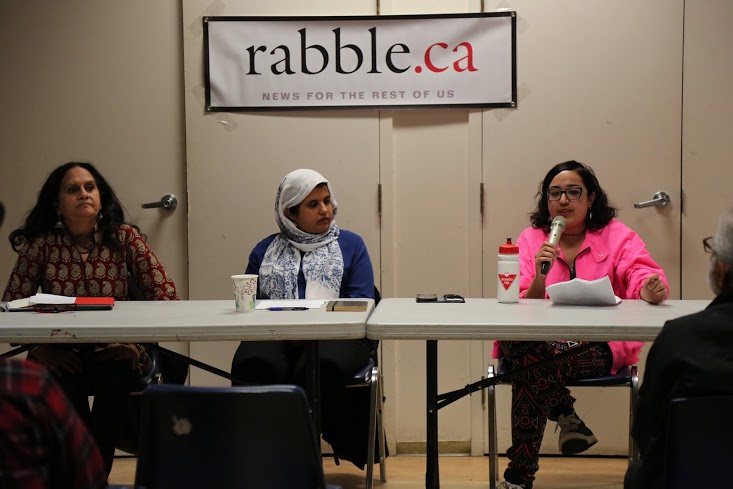Like this article? rabble is reader-supported journalism. Chip in to keep stories like these coming.
The media has a powerful ability to shape the way we view our world. In the midst of elections, international conflicts and refugee crises, Islamophobia has permeated our news cycle.
Three panelists shared their firsthand, lived experiences and perspectives of Muslim communities on Tuesday evening in Vancouver at the Combatting Islamophobia in Media event present by rabble. Together, they engaged in an important dialogue about the value of diversity, storytelling and truth sharing from the hands of marginalized communities within the media.
Urooba Jamal, a writer and Pakastani Muslim immigrant shared how she first became interested in the media: because the media was interested in her.
Jamal spoke candidly about the reality of perpetuating stereotypes of Muslims that suggest they are all oppressed, violent and misogynistic and that these perceptions have had significant ramifications.
“The climate of Islamaphobic media is…what has justified U.S. invasions of the Middle East,” she said. “It’s justified drone attacks, it’s why Guantanamo Bay is still open, why there’s police surveillance in Muslim communities, why we see arson attacks on mosques and temples and why we see hate crimes against those that are perceived to be Muslim, including many Sikhs.”
PhD candidate Itrath Syed, the second panelist to speak, echoed these sentiments, saying that “Muslim” and “Islam” have become code words for a set of fears. She also explained that even though Islamophobia looks different in different regions, it can often be used as a tool during moments of media crises or moral panics.
“I look at moral panic as a particular moment — a temporally contained moment — in which there is some issue that everybody is obsessed about and is constructed of such a great concern that it sort of stands in for a moment of national crisis or civilizational crisis,” she said.
However, both Jamal and Syed noted that it’s not just Muslims that are affected by the violence, hatred and misunderstanding that these moral panics spur on, but also those who are perceived to be Muslim.
“It’s not just upon Muslims,” said Syed. “It’s about anyone who is assumed to be Muslim because it’s not about Islam, it’s about the racialized construction of what it means to be Muslim.”
Continuing on with this discussion, Sunera Thobani, Associate Professor at the Institute for Gender, Race, Sexuality and Social Justice, said that both the definition of Islamophobia and the depiction of Islam are both extremely important.
“The depiction of Islam as inherently violent and misogynist is far too commonplace,” she said. “As is the view that it is a religion which promotes violence and the hatred of women.”
Thobani also pointed out that most understandings and depictions of Muslims often erase diversity, as they tend to focus on Arab or South Asian, even though Islam has been present in North America since colonization.
“We tend to erase the fact that Islam came to the Americas with the first Europeans who came here, that Islam has been a major practice that has been indigenized by black people in the United States who came and who were brought over as slaves,” she said. “So Islam has a very long history in this continent that predates the coming of Arabs and South Asians and other Muslims onto these territories.”
In other words, Jamal, Syed and Thobani all made it very clear that the media is not portraying Islam in an accurate or helpful way.
All three, however, offered suggestions for how the media can move forward.
Thobani suggested that alternate media should seek to challenge politics and encourage political engagement, while Jamal spoke about the importance of amplifying marginalized voices and being a source of education for those who might not be aware of these issues.
Echoing the importance of marginalized voices, Syed spoke at length about the erasure of Muslim humanity as a result of its lack of inclusion in the media.
“What’s actually happening is that there are a lot of white people in power talking about Muslims negatively and a lot of white people in power talking about Muslims positively. What is missing from this conversation is actually the input of Muslim communities,” she said.
“We have to actually…have room for an actual Muslim to be in a conversation and to have a way of seeing Muslims as being real, complete, complex, diverse, differently opinionated humans.”
Stay tuned to rabble’s podcast page to listen to the entire recording of Tuesday’s event.
Alyse Kotyk is a Vancouver-based writer and editor with a passion for social justice and storytelling. She studied English Literature and Global Development at Queen’s University and is excited by media that digs deep, asks questions and shares narratives. Alyse was the Editor of Servants Quarters and has written for the Queen’s News Centre, Quietly Media and the Vancouver Observer. She is now rabble’s News Intern.



